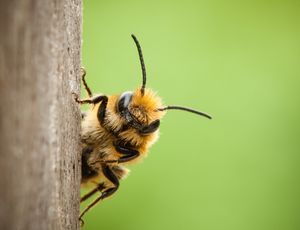
Ten international research projects have been selected in the BiodivERsA Call 2018 competition co-organised by the National Science Centre. Amongst the winning projects there are six that feature scientists from Poland, and one of them is Dr Michał Filipiak from the JU Faculty of Biology.
The competition Biodiversity and its influence on animal, human and plant health was announced in October 2018 by 15 organisations that provide funding for researchers from 11 countries. There was a total of 49 applications, with the selected ten receiving a combined funding of 11.9 million euro.
Dr Michał Filipiak’s international project, NutriB2. Nutrition as critical link between Biodiversity and Bee health, is conducted in collaboration with researchers from Germany, Austria, Belgium, France, Great Britain and the United States. According to the project’s leader, a balanced diet is key to the well-being of any animal and has a positive effect on their adaptation to the environment, while high levels of biodiversity in an ecosystem can greatly contribute to that balance. In this context, it is therefore suggested that there is a direct cause-and-effect correlation between decreased biodiversity and bee die-offs. The details, however, are still not fully understood. The scientists plan to investigate the relationships between the biodiversity of flora, quality of bee food and health, condition, and diversity of bees that can be found in certain biological communities.
‘In our research, we want to combine elements of taxonomy, nutritional ecology, biogeochemistry, physiology, behavioural ecology, epidemiology, and ecological modelling. As a result, we’ll be the first in the world to point to specific nutritional elements and assess the correct proportions needed to maintain a balanced diet for different types of bees. Based on that, we’ll be able to find out the specific plant types needed to properly feed the bees. This new knowledge will be vital in understanding how the biodiversity of flora affects the biodiversity of bees’, explained Dr Michał Filipiak.
The projects realised within the framework of BiodivERsA Call 2018 are scheduled to commence this year. For more information about the competition, please visit biodiversa.org.





